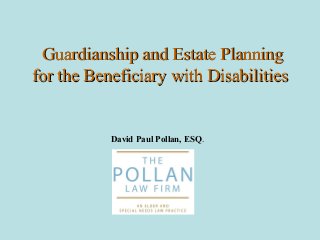Guardianship and Estate Planning for the Beneficiary with Disabilities
- 1. Guardianship and Estate PlanningGuardianship and Estate Planning for the Beneficiary with Disabilitiesfor the Beneficiary with Disabilities David Paul Pollan, ESQ.
- 2. Guardianship and Estate Planning forGuardianship and Estate Planning for the Beneficiary with Disabilitiesthe Beneficiary with Disabilities A. Guardianship for The Beneficiary with Disabilities 1. What is Guardianship? a) Liberty Interests b) Rights 2. An Alternative to Guardianship – What is a Power of Attorney? a) The different Types of Powers of Attorney b) When Guardianship is Recommended A. Estate Planning for The Beneficiary with Disabilities
- 3. What is Guardianship? Guardianship is the legal proceeding for the appointment of a legal representative to someone who either lacks decision making capacity or is simply unable to communicate their decisions because of mental or physical impairment. Guardianship removes the disabled person’s rights or “liberty interests”
- 4. Liberty interests which are usually removed from the disabled person by the court, include: The right to contract marriage The power to enter into contracts The power to consent or refuse medical treatment The power to decide where to live Management of monies and property.
- 5. The disabled person always maintains the following rights: Right to a guardian who will act in his or her best interests and whose affairs do not create a conflict of interest Right to a guardian who is reasonably accessible to him or to her Right to have his or her property used to provide for his or her support, care, education, and well being Right to communicate freely and privately with others.
- 6. When Is Guardianship is Recommended? There is no alternative to Guardianship when: The disabled individual lacks capacity to execute power of attorney An inheritance (or life insurance benefits) has been left and the disabled individual is neither competent to manage this inheritance nor to execute a power of attorney authorizing someone to manage this inheritance for him. There is a dispute between the parents as to medical decision making.
- 7. An Alternative to Guardianship What is a Power of Attorney? A power of attorney is a way that a person can give another person authority to act on their behalf. Power of attorney is usually a written document that specifies what authority is being granted. It can include broad grants of authority to make any type of healthcare and/or financial decision necessary.
- 8. The different types of Powers of Attorney A healthcare power of attorney can include authority to make decisions concerning matters such as the admission, transfer or discharge of the person from a healthcare facility such as a nursing home, assisted living facility, or hospital, consent to medical care and treatment, refusal of medical treatment, and can also include authority to order the withdrawal or withholding of life support and death-delaying treatment even though death may ensue. A financial power of attorney also grants authority but only with regard to monies and property. Some typical examples of the types of authority frequently conveyed include bill paying, banking transactions, purchasing or selling real estate, and investment transactions. The level of capacity or “competency” necessary to execute a power of attorney is determined by applicable state law.
- 9. Website: www.pollanlawfirm.com Ph: 678.510.1358 Find the Pollan Law Firm on Follow The Pollan Law Firm on David Paul Pollan has been practicing exclusively in the area of elder law and special needs issues affecting the younger disabled community since 1990. He is a member of the National Academy of Elder Law Attorneys and has served the elder and disabled communities through his work with AARP, Atlanta Regional Committee Aging Services Board, the Senior Citizens' Law Project, the Elder Law Committee of the State Bar of Georgia, the Georgia Community Trust and Weinstein Hospice. He is also a member of the Georgia ElderCare Network, a statewide alliance of professionals assisting Georgia families to plan and deal with the issues of aging. David P. Pollan has worked in the field of elder law for 20 years. He is AV®-rated* under Martindale-Hubbell’s peer review rating system, and frequently publishes and lectures on elder law and special needs law issues. 1801 Peachtree St. Suite 150 Atlanta, GA 30309
- 10. Website: www.pollanlawfirm.com Ph: 678.510.1358 Find the Pollan Law Firm on Follow The Pollan Law Firm on David Paul Pollan has been practicing exclusively in the area of elder law and special needs issues affecting the younger disabled community since 1990. He is a member of the National Academy of Elder Law Attorneys and has served the elder and disabled communities through his work with AARP, Atlanta Regional Committee Aging Services Board, the Senior Citizens' Law Project, the Elder Law Committee of the State Bar of Georgia, the Georgia Community Trust and Weinstein Hospice. He is also a member of the Georgia ElderCare Network, a statewide alliance of professionals assisting Georgia families to plan and deal with the issues of aging. David P. Pollan has worked in the field of elder law for 20 years. He is AV®-rated* under Martindale-Hubbell’s peer review rating system, and frequently publishes and lectures on elder law and special needs law issues. 1801 Peachtree St. Suite 150 Atlanta, GA 30309

